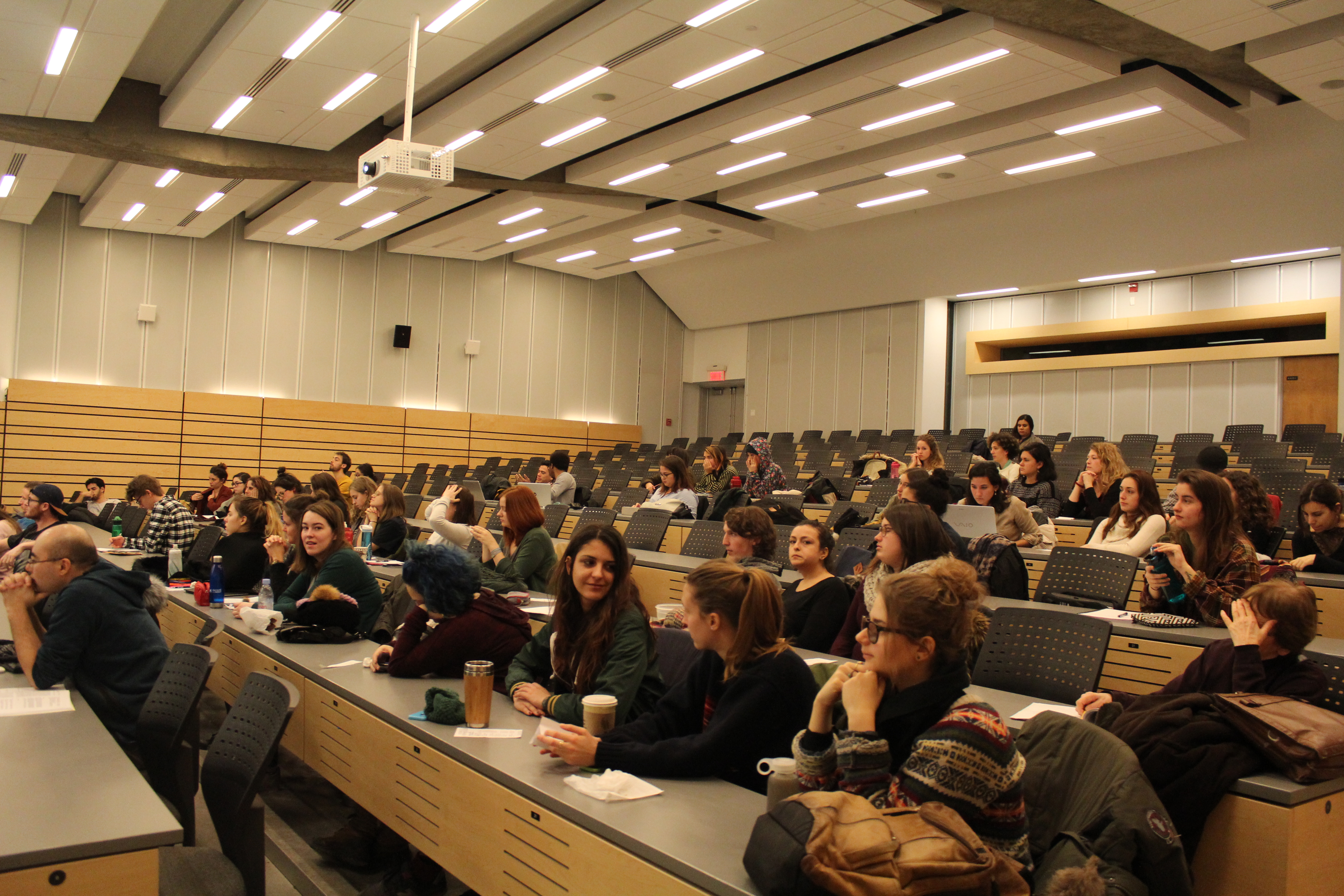The French university hosts its first-ever conference on intersectional feminism
The Regroupement des étudiants de l’Université de Montréal en soutien de l’ONU Femme hosted its first-ever event on Feb. 6—a conference dedicated to international feminism called “Le féminisme autour du monde: orient et occident.”
The conference coincided with the Semaine interculturelle de l’UdeM, a week dedicated to promoting the plethora of cultures that exist in and outside the university through conferences and activities. The conference featured two speakers: Ryoa Chung, a professor of philosophy at UdeM, and Khaloua Zoghlami, a doctoral candidate in communications at UdeM.
The bulk of the conference focused on international feminism and the many problems that arise when trying to apply feminist theories to women in varying cultural situations. Chung, the first speaker to address the crowd in the lecture hall, outlined many of the theoretical problems associated with using liberal feminism as the ideal way for women to emancipate themselves in other countries. Liberal feminism is assumed to be the most objective feminist theory because it pulls from the Liberal political theory, but it can impose Western values onto different cultures.

Chung warned that, while laced with good intentions, liberal feminism easily veers into this type of imperialism when proponents of this type of feminism do not make themselves aware of the particular struggles women in underdeveloped countries face.
“When we want to speak in solidarity for another person, there are pitfalls that we need to avoid, and one of these pitfalls we need to avoid is positioning ourselves as the saviour who knows how to save the other woman from herself,” Chung said.
She cited many examples where the epistemology and the basic theoretical constructs of some branches of feminism already put specific groups at a disadvantage. For example, sometimes the perspective of a religious or racial group cannot even be recognized by the majority, therefore any specific challenges they face are not represented in any actions taken.
Zoghlami brought to light many of the theories presented by Chung during her discussion, using her own experiences as a Tunisian-born woman as a springboard into talking about intersectional feminism. She said the type of liberal feminism women ascribed to in Tunisia was very confining.
“You had to be a specific type of woman to truly benefit from the rights allocated to women, because if you were a women who wore a veil, was attached to your religious practice, came from an underprivileged area, were black or were a collection of all that, these privileges did not concern you or were not concretely applied to you,” Zoghlami said.
She said one of the oldest and most influential feminist associations in Tunisia, L’Association Tunisiennes des Femmes Démocrates, supported the government’s measures to dissuade women from wearing their veil. At that same time, the government was already enforcing bans that blocked women who wore a veil from getting a job or an education. The liberal feminism these women borrowed from their French counterparts, she said, was derived from an imperialistic mindset and left no room for some women to practice their religion if they so chose to.
Zoghlami added that this was not a type of feminism she could identify with, because, in her view, it only fought for a small portion of women. She said she struggled to consolidate her identities as a woman and as a Muslim.
Only recently was Zoghlami introduced to the idea of intersectional feminism. Intersectional feminism argues that there are specific challenges associated with women who associate to more than one group, such as religion, race or sexual orientation. It states these specific challenges should be fought in tandem with one another, not separately. For Zoghlami, this means being able to fight for her rights as a Muslim woman, not as a Muslim and a woman.
Lia Ferranti, the president of the Regroupement des étudiants de l’Université de Montréal en soutien de l’ONU Femme, said the group really wanted to host an event in relation to the very popular Semaine interculturelle de UdeM.
“We asked ourselves how we could talk about feminism and interculturality, and we told ourselves, well why not talk about feminism around the world?” Ferranti said.
With 600 people interested in their Facebook event, Ferranti was surprised by how easily the conference came together. She said both Chung and Zoghlami were extremely open to speaking at the conference. “We realized that their two subjects really corresponded to the Occident and the Orient, and we set it up in a way to try to touch on everything, and it all came together,” Ferranti said.
She said the university was there to help and support them along the way.
“We are the first feminist organization recognized by UdeM,” Ferranti said. “The executive committee is practically all the founding members.”
The group is currently awaiting official recognition from the UN headquarters in New York in order to be named UN Women UdeM, but Ferranti said it will still take a while.




